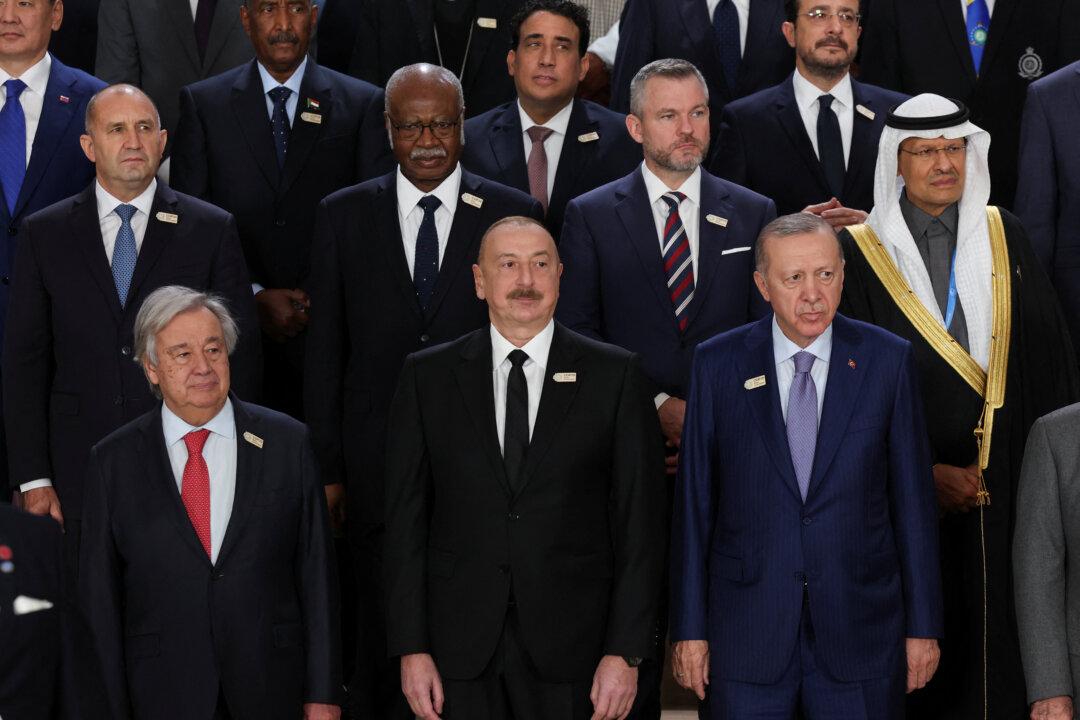The U.N.’s annual agenda-setting climate talks got underway this week.
COP, or the “Conference of the Parties,” serves as the central platform under the U.N. Framework Convention on Climate Change, where world leaders, scientists, and negotiators convene annually to drive “global climate action,” often culminating in pledges of vast financial commitments.
The summit lasts for two weeks, but already this year’s talks have revealed new shifts in thinking, some unusually early pledges, new controversies, and a shift in attitude toward the talks themselves by global leaders.
Controversial Host Azerbaijan
The conference opened under a cloud of controversy after its host, Azerbaijan, an oil-rich country, faced scrutiny over its continued dependence on oil and natural gas.President Ilham Aliyev defended his country in his keynote address at the climate summit claiming that Azerbaijan is the target of a “well-orchestrated campaign of slander and blackmail.”
“As president of COP29, we will be strong advocates for green transition, and we are doing it,” Aliyev said.
No-Shows
The recent victory of President-elect Donald Trump raised questions over the future direction of climate talks.The United States is expected to renew its focus on expanding fossil fuel extraction under the incoming Trump administration.
Several prominent leaders opted not to attend this year’s COP.
U.S. President Joe Biden is being represented by climate adviser John Podesta, while Chinese President Xi Jinping has sent a deputy.
Trillion-Dollar Climate Finance
Negotiators are working toward a new goal of up to $1 trillion annually in climate financing for developing countries, aiming to replace the former $100 billion target. Multilateral banks are also proposing to increase climate finance for low- and middle-income countries to $120 billion a year by 2030, aligning with Paris Agreement goals.Simon Stiell, the U.N. climate change executive secretary, warned that unchecked climate impacts could drive global inflation.
“Worsening climate impacts will put inflation on steroids unless every country can take bolder climate action,” he said.
Researcher Ben Pile, who runs the Climate Debate UK campaign group, previously told The Epoch Times that he believes “billionaire interests have been well served by the U.N.’s and other global agencies’ financialization of energy and emissions regulation.”
Despite the vast amounts of funds being discussed, climate activists said that not enough was being done.
Carbon Credits
On the first day of the conference, negotiators agreed to establish a U.N.-backed system for trading carbon credits, aiming to support a decade-long goal of launching a centralized carbon market by next year.Samuel Furfari, a senior official at the EU’s Energy Directorate-General from 1982 to 2018, expressed surprise at the timing of the agreement.
Nuclear Energy
Momentum around the role of nuclear energy in the hydrocarbon transition has rekindled global interest in nuclear power.Climate Reparations
There are still ongoing negotiations on climate reparations.However, he said that there wasn’t enough money.
“But its initial capitalization of $700 million doesn’t come close to righting the wrong inflicted on the vulnerable,” he said.
Tensions Between France and Azerbaijan
French climate minister Agnès Pannier-Runacher also canceled her trip after Aliyev accused France and the Netherlands of “colonial rule” in a COP speech.France and Azerbaijan have long had tense relations because of Paris’s supplying of arms to Armenia as tensions remain high over the contested Nagorno-Karabakh region.
Calls for COP Reform
Senior figures from The Club of Rome have called for a fundamental overhaul of the COP process.“Its current structure simply cannot deliver the change at the exponential speed and scale essential to ensure a safe climate landing for humanity,” said the signatories, who included former U.N. Secretary-General Ban Ki-moon, former U.N. Climate Chief Christiana Figueres, and former President of Ireland Mary Robinson.
Paul Shrivastava, co-president of The Club of Rome, echoed these concerns.
Critics often compare Limits to Growth to Thomas Malthus’s pessimistic 18th-century writings on population growth outpacing food supply.
Looking Ahead to Next Week
As COP29 heads into its second week, discussions will focus on gender transparency, adaptation finance, and just transition strategies.Official sessions will address climate resilience, but many expect key negotiations and potential deals to unfold behind closed doors.






